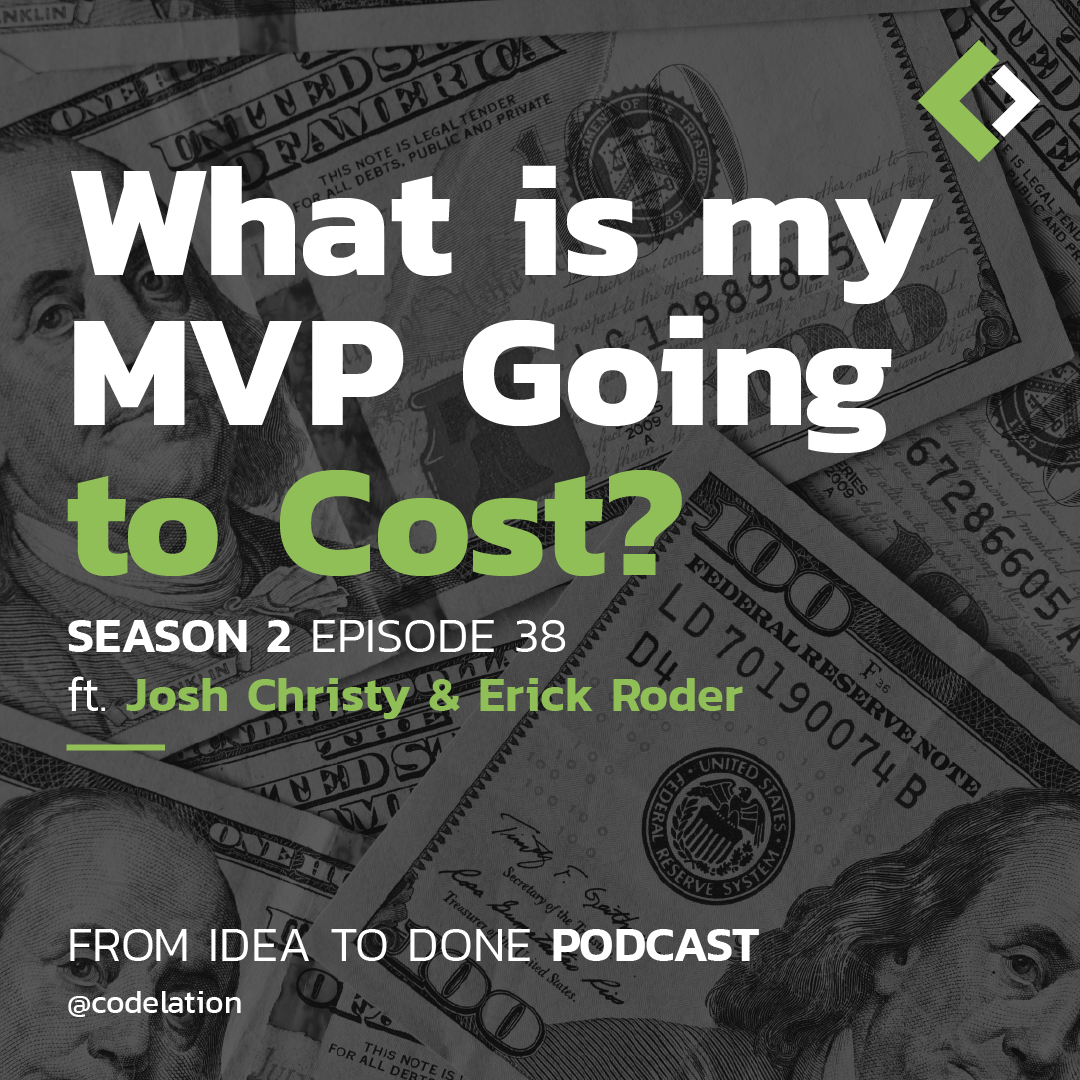Should I Pay With Equity?

What Is My MVP Going To Cost?
September 22, 2020
When Should I Find An Investor?
October 6, 2020VO: Get ready for your semi-regular dose of random ideas from the guys at Codelation. We like to talk about big ideas companies that are winning, and those that aren't along with current events in our crazy world of software startups. So come along with Erick and Josh, who challenge you to think big, start small and turn your ideas into something on this episode of, from idea to done.
Josh: Hey Everyone, I'm Josh
Erick: And I'm Erick and today's idea is should I pay people with equity? And this is kind of interesting to me. And, you know, we run into this quite a bit in our world. And so people want to develop, do have us do all of this stuff for free. And then when they hit a big with their amazing idea, we'll all be rich. And, and Josh you've been in this world a lot longer than me. What are kind of some of your thoughts on getting offered equity?
Josh: You know, we, we do get this question a lot, um, in the form of, would you build my tool app, whatever, for equity in our company. I also see it a lot with early stage startups, you know, trying to get employees on board to grow their team. I'm not, I'm not talking co-founders, but trying to get an employee on this. Here's how I'd look at it is if, if somebody approached Josh to come into their company from an equity standpoint, I look at it and say is, um, if money are no issue, could I help this startup for free? Um, probably the biggest thing is, can the team actually sell the product? Like, what is the strengths of the team? Can I keep, um, movement in this? Or am I going to be a, you know, bringing the team down because I've got other work going on, like is going to be a distraction for me? How did they plan to sell or get out? You know, what's my equity going to be worth if they can't sell the company and what I lose any sleep, if all of my shares just disappeared,
Erick: I think that's a pretty good checklist, you know, getting into, yeah,
Josh: Basically the world's going to blow up. And is that okay?
Erick: Is that okay if this fails? And that's a interesting question to ask any business and we, again, we get this question a lot. And how do you think people should be thinking about offering equity before they even ask someone to work for it?
Josh: You know, again, I go back to, are they co-founders or are the employees, and those are two different ways to look at things. If it's a cofounder, make sure that the amount of equity is equal to the investment they're making in the company.
Erick: What do you mean by that?
Josh: So if, if you look at it and say that, um, it is it equal if one person uses their contacts to market and, you know, sell, sell the solution and the other co-founders responsible for building the technology, right? The developer might look at it and say, you only made a few phone calls and I'm spending months to build this out. Or if one of the, co-founders put some money in to help the co-founder pay their bills, like where's the line. And it's just a lot of good conversation to have before you get started. Cause it's, it's easy to get, you know, have conflict once you're in the middle of it. And it may seem easy peasy on the outside and you may make some, some bad decisions by not thinking through it,
Erick: You know? And, and I think that that is kind of where it gets muddy. I, it makes me think about shark tank. You know, there's no way that mark Cuban actually is actively trying to put his heart and soul into some of these startups that he sees. But, you know, saying mark Cuban from shark tank bought into my idea. I think that can close a ton of initial business. I just, I don't know how great I would feel as the actual founder of a thing, you know, kind of once you get past that initial startup stage and it's starting to make money and now we have to pay mark Cuban a percentage and he's completely detached.
Josh: Yeah, no, absolutely. I think just, you know, shark tank has a platform even just to go on there. I've heard websites crashing even when they're on the pitch. So it's a, it's a great platform, but kind of disconnected from reality in some ways. Um, you know, I talked about the idea of the co-founder and making sure that the co-founders are aligned. If, if it's an employee too, that's also a different story. You know, the way I'd recommend startups look at and say, if someone's trading their time for money as an employee, and is it easier for an employee degree to come on board at like a breakeven wage and then a future upside, you know, so simple math of like, you know, if you're breaking even two grand a month, three grand a month, could you agree to the next six months for you to say it's going to be tight, but we, I can agree to that to have a higher upside on, on the backend and then everyone's aligned. And you know, maybe, maybe that, that pulls the team closer together versus I've got 10% equity in a company that is not going to be worth anything.
Erick: And that's actually, so before I worked for you, that was my exact experience. I knew two friends in the signage industry and I was just out for a beer with them. They said, oh, we kind of need our Cuban. You know, I can't, I wasn't quite more Cuban, but they, they were trying to buy out some of their initial investors that weren't putting any time. And they wanted to be able to offer me the equity that they were buying out and come in as kind of this, you know, tiebreaker vote kind of scenario. And what was interesting about that whole experience. And it was a couple of years and I did really enjoy my job, but like I learned in that, that I don't want to own a pice, like there's so much work and like extra time involved when you have to put on that owner hat that I really just want to be kind of a, a good employee for a smaller company. And that kinda brings us to today.
Josh: Yeah. You know, I think that's a good example of, it's easy to get excited on the front end about the ownership angle. Um, but if you've gone through this a couple of times, it's pretty easy to, to see, um, you know, how seasoned the entrepreneur team is that they're, that's their first move is equity in the company versus, um, versus, uh, a payroll and, you know, six months in not being able to pay your bills, you know, and I know exactly what my wife had to say to me at that point.
Erick: We'll just, we'll say it was just a learning experience scraping by for a couple of years. And so move on. So let's say, you know, someone comes in with that idea and we're comfortable with pairing it, like pairing up with them and teaming up with them. What are some of like the longer term things people should be thinking about in a situation
Josh: Like that? Yeah. And we've, we've absolutely done this with, with clients and I wouldn't recommend doing it right off the bat as your first, your first interaction with them. Can we put together a smaller pain project? And then once we proven we're good partners for each other, then lean into something. And I like the concept of a joint venture for that. Each team is going to have their strengths and weaknesses. Um, I'd recommend you put together a timeline with your sales and your development goals and hold each other, or each other's teams accountable. It's so easy to get into it. And then this is a little side thing for both of you and it just falls apart because nobody's really that focused on it. Um, also for us as a company, I wouldn't consider an equity standpoint. Um, I prefer to do, like I said, a joint venture that has some sort of a revenue share or a profit split or something that's tied to actual actual monies and not equity.
Erick: And I think it is, it's important to find that split or where the happy breakup is going to be if you're going to do kind of a joint venture. And so lastly, we'll just kind of get at what are some things that other dev shops or people in our world should be thinking about before they agree to work from equity or for equity,
Josh: You know, from the dev shop perspective or agency perspective is what's the equity worth and can the team ultimately exit the company via sale? Like, is it actually going to be worth something in order to, we just sign up for, you know, free work for the next 2, 3, 4, 5 years? Um, if it's an individual, you know, kind of what I talked about earlier of if money is no issue, could I help the startup for free? Um, can I manage this alongside my other work? How are we going to make money? How are we going to sell? And if, if the company closes stores, what I lose sleep.
Erick: And again, these are like really important questions to get real answers for. You know, you eventually hit that getting out of the dreamy like, oh, let's work. This would be amazing. Like you should have kind of some ideas on how to get out of the dream and then get into your next dream of buying a goofy yachts if it really, so, yeah. Do you have any like last final thoughts I'm working for equity,
Josh: It's so easy to put together a graph for your, your growth and, you know, it's, it starts at the bottom left and it goes up to the right, like a hockey stick. Like it's, it's easy to get trapped in the, the excitement of the startup and the, the dream of owning the yacht. Um, but it isn't something you should go into without some consideration. Um, you know, I think we've all heard the success of like the first janitor at Facebook or the guy that painted the murals is now a billionaire. And that's really more of an exception than the rule. The really, the only way you get paid with equity in a company is if you can sell that equity at some point,
Erick: Which I, and I mean, if I started something from the ground up, I don't even know if I would want to sell out of a company that I came from infancy, but that could be another episode even. So until then, thank you for listening. We hope you know, of a syrup that could use advice and random thoughts, send them over to codelation-bedrock.flywheelstaging.com to hear our next podcast.
Sign up to receive email updates
Enter your name and email address below and I'll send you periodic updates about the podcast.
